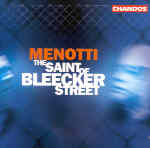It’s not ersatz-Puccini, it’s echt-Menotti; if the triad associated with Annina’s (the eponymous saint) holiness and religiosity in general is reminiscent of Suor Angelica, well, it’s a religious sound: Arvo Pärt uses it too. And besides that, it’s gorgeous. Here is the long-awaited, very necessary modern recording of Menotti’s beautiful–and possibly great–1954 opera. The only other recording (in mono) from 1955 and wonderfully led by Thomas Schippers never has been transferred to CD and has been unavailable for decades. Re-listening to it in preparation for this review, it is undeniably better than the present Chandos release–but what can you do?
Menotti wrote both words and music; the latter has worn better. The prose is amazingly purple: I have lived in New York my entire life and have known dozens of people from Little Italy, and not one of them has ever said anything like “…don’t forget that love is a pitiless hunter when allied with death,” as Desideria says to Michele. And of course, the modern age would not allow Michele to be quite so psychologically unaware. The sentiments and passions are real, however and the religious fervor at the center of the whole opera is if anything more alive now than before.
Annina’s single-minded passion for Christ is the opera’s core, and her music is the most beautiful, whether in religious vision or more secular moments. Her opening “vision” scene, wherein she “sees” Christ’s crucifixion, is one of modern opera’s most wildly effective moments; her duet with Michele in the first act’s second scene is similarly effective. Michele’s aria in Act 2 is a tenorial dream, and the choruses and crowd scenes are also fine. Menotti even manages to capture the terrifying energy of the San Gennaro festival. Emotional temperatures run very high in this opera at almost all times–even Puccini gave us more respite from angst.
This present recording is warmly conducted (somewhat more slowly than Schippers throughout; it runs about eight minutes longer), but that, and the superb engineering, allows Menotti’s score to be heard very clearly. The Spoleto Festival Choir and Orchestra play beautifully for Hickox, and his lingering over the more overtly sentimental moments does no harm. The supporting cast–Pamela Helen Stephen’s Desideria, John Marcus Bindel’s Don Marco, and the rest–is first class. But what do you do about a performance in which the Annina is hard to listen to and the Michele (a character who is difficult to put up with in general) does nothing but whine?
Soprano Julia Melinek, who looks young in the performance pictures in the booklet, also counts Butterfly among her roles: it, or something, has created an ugly wobble in her voice in almost all registers and at almost all dynamic levels. Her involvement with the character and text are admirable; her sound is a shocking detriment. Welsh tenor Timothy Richards’ voice is not without affecting qualities, and he manages Michele’s difficult exclamatory music well (and many high notes, including a big C at the end of his “I know that you all hate me” aria), but in his desire to create a character, he hectors and pouts and makes less of the role.
So there you have it–a fine, fine-sounding Saint, with two ugly holes at its center. Find the old RCA in a used record shop or hope it’s re-released; there once was a pirate version of the opera available with the amazing Catherine Malfitano in the title role. This new set only fills part of the gap.
































